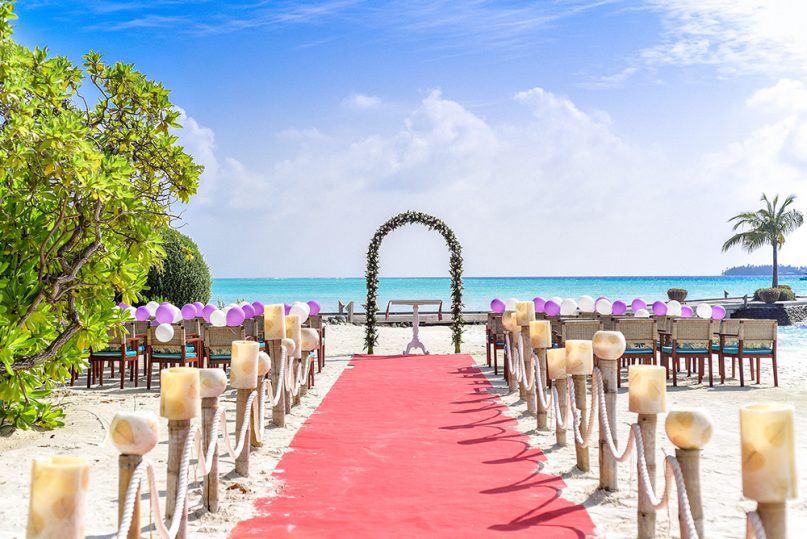I was talking to a young friend the other day. She told me that she had just attended a Jewish wedding — two thirty-something Jews getting married.
“Which rabbi performed the wedding ceremony?” I asked.
Her response was telling.
“A rabbi? Who does that anymore?”
Hmnn.
Apparently, my friend was not wrong.
Over the last few months, I have been reading the Sunday New York Times wedding pages — um, religiously.
I have been doing a silent survey — seeing how many wedding ceremonies were performed by clergy, and how many were performed by friends of the couple and/or people who had gotten instant ordination as, say, Universal Life ministers.
On the average, non-clergy/instant clergy do about a third to a half of all weddings in the New York Times.
So, yes — this is a trend. Dorothy Bush Koch, the non-clerical aunt of Barbara Bush (daughter of W, granddaughter of George H.W. Bush) performed Ms. Bush’s wedding earlier this month. I would imagine that there were any number of clergy people available to do this state wedding. But, that didn’t happen.
You would probably say: “Sure, Jeff, you’re a rabbi. No wonder this troubles you. Your livelihood depends on it!”
Not so fast.
For me, and for many of my colleagues, the issue is not livelihood. Most Jewish clergy do not set fees for weddings or other life cycle ceremonies for their members. (Non-members is a different story). Most of my clergy friends in congregations are not out chasing weddings or funerals or whatever. We have enough to do, thank you very much.
Likewise, I have many rabbinical and cantorial colleagues who do not serve congregations; in such cases, their livelihood really does depend on being there for and with people in their sacred moments. That deserves both attention and respect, as well.
The issue is not who can perform a wedding ceremony. Truth be told: you don’t “need” a Jewish clergy person for a Jewish wedding ceremony. Technically, any knowledgeable lay person can perform a wedding ceremony — or, to be precise, to be a mesader kiddushin, the one who arranges the wedding ceremony and makes sure that everything happens correctly.
The same is true of any Jewish life cycle ceremony or worship service — a brit or baby naming, a funeral, a conversion, etc. People will usually say that they won’t “feel” “really” married, etc. if a member of the clergy is not present. I honor those feelings — and I hope that people will continue to feel that way.
The issue is not pre-marital counseling, which is often a part of the wedding process. Not every member of the clergy feels competent to offer such counseling, and sometimes couples will go elsewhere. Again, you don’t need a clergy person for such an important piece of the wedding puzzle — should you want it.
For me, there are two essential issues.
First, it’s about clergy authenticity.
If you want to have a friend or family member perform your wedding — because he or she knows you well — I get it. I am not offended.
But, at the very least, can that person get a one-day wedding officiant pass? Many states now make provisions for people to do this (here is New York’s bill that permits it).
Just do me — and all of my clergy colleagues — a favor.
Don’t go the ” instant ordination” route.
Why not?
Because, whether they know it or not, those who get instant ordination for the purpose of performing weddings are actually mocking the meaning of what it means to be clergy.
“Real” clergy study, long and hard. Speaking for rabbis, we study in a graduate program for five years, including the first year in Israel. We study Bible, midrash, mishnah, Talmud, liturgy, theology, history, homiletics, counseling, Jewish literature, etc. We write theses based on Hebrew texts. We take advantage of internships, mentoring, student pulpits, for valuable experience.
To become a clergy person in order to do a wedding, or even many weddings, reduces our sacred tasks and responsibilities into one life cycle ceremony. “Real” clergy officiate, and teach, and engage in activism, and counsel, and comfort, and manage, and…
It diminishes — actually, lampoons — our years of training and commitment.
Frankly, it is an insult — even though it was not intended that way.
Second: It’s about tradition.
When authentic members of the clergy perform a wedding ceremony, they bring with them an entire box of traditions, ancient and modern. They lead the couple through a ritual of poetry, gesture, tastes, smells, prayers, music, symbols. They did not invent those rituals. They merely (!) inherited them, and they are passing them on to those whose lives are intimately bound up in that moment.
If the non-clergy-officiating-friend-or-relative is knowledgeable in those traditions (and, theoretically and ideally, could be), great. The officiant and the couple can study together, create, improvise, add — and it works for everyone. Just the way it would work if a clergy member was present.
But: I worry about what happens when we willingly jettison traditions at the most sacred and most sensitive moments of life — especially when those traditions speak so forcefully and so poetically to the human condition.
You want friends to speak at your wedding? Great.
You want them to read part of the ceremony? Wonderful.
But, ideally, the officiant brings something from outside the couple, and from beyond the couple and their immediate circle of family and friends. Ideally, the officiant brings something that predates the couple by millennia, and will, we pray, live way beyond the couple’s time on earth.
That “something” is called the holy.
And, last time I looked, the holy has become an endangered species.






